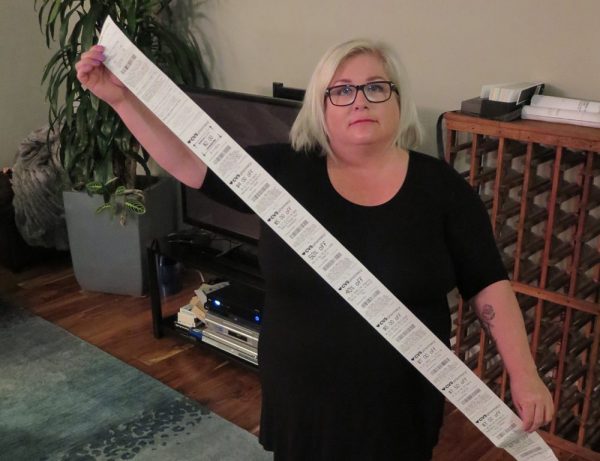Daily Business Report-March 22, 2019
Carol Dahmen poses with a receipt that’s more than 4 feet long—for the purchase of a single item. (Photo via Kevin Eckery for CALmatters)
Skip the slip? California lawmaker wants
email receipts to replace paper ones
By Elizabeth Castillo | CALmatters
When Carol Dahmen discovered the CVS receipt draped across the counter of her Carmichael kitchen, she couldn’t resist pulling out her tape measure to document it.
Her husband had purchased one single prescription. The receipt, she discovered, stretched on to contain 11 coupons before topping out at an astonishing 4 feet 8 inches—the height of Olympic champion gymnast Simone Biles.
“This receipt is ridiculous and unnecessary,” Dahmen tweeted, endorsing the idea of scrapping paper receipts for emailed versions.

California lawmakers are considering just such a proposal— a bill by Democratic Assemblyman Phil Ting of San Francisco that would make emailed receipts the default for businesses grossing more than $1 million beginning in 2022. Businesses breaking the rule could be fined $25 a day, up to $300 a year. Customers could still get a paper receipt, but they would have to request one—which some would undoubtedly do, rather than share their email addresses with many merchants.
The state already bans single-use plastic bags and this year, mandated that plastic straws be available by request only. If the default e-receipt bill passes, California would once again become the first in the nation to crack down on another ubiquitous product of modern existence.
“They’re wasteful and they’re toxic,” Ting said about receipts. “Their lack of recyclability really makes them problematic.”
Receipts increasingly are made of thermal paper, and thus printed without ink. A chemical sometimes used to coat thermal paper, Bisphenol A (BPA), mimics estrogen and has been linked to cancer; in 2012, the U.S. Food and Drug Administration banned its use in baby bottles. Receipt paper now more commonly contains Bisphenol S (BPS), a replacement for BPA that some recent studies, including one from UCLA, indicate may be just as harmful.
Opponents say this is yet another hurdle for California small businesses, and a privacy concern for customers.
“It’s trying to reduce paper waste and that’s commendable, but we just want to make sure that in the process we’re not creating a big digital trail for everyone who goes into a drug store,” said Bennett Cyphers, a staff technologist at the Electronic Frontier Foundation, a nonprofit digital rights group. “If the business needs to collect some kind of contact information, what do they do with that data? It’s going to be a field day for data brokers, data about what people buy and who’s buying what and when. We’d really like that not to be the case.”
Receipts account for millions of pounds of trash waste, and an estimated 9 billion gallons of water, according to Green America, an environmental group supporting the bill.
“We don’t really need to use that paper and definitely that water,” Ting said. “We can really save those resources for something else.”
Advocates say Ting’s bill is an easy remedy. “It’s tackling one of the lowest hanging fruit,” said Nick Lapis, director of advocacy for Californians Against Waste.
Others suggest the bill could go even further. Republican Heath Flora of Ripon said in a written statement the bill could apply to more than just businesses.
“I’m open to the idea of doing away with paper receipts, but right now this bill only applies to businesses and not the state government,” he said. “We should also have a conversation about what to tell the folks who aren’t very tech savvy, or who otherwise don’t have access to internet services.”
But some say the bill could burden businesses in more rural parts of the state. Just 59 percent of rural households have broadband internet access, according to a report by the Public Policy Institute of California.
“To do it electronically and mandate that for everybody is quite frankly going to be burdensome on business,” said GOP Assemblyman Brian Dahle of Bieber. “Every day it’s something new with the labor code, every day it’s something new with the regulatory environment, and this is just one more add on, making it tough to stay in business in California.”
Dahle contends that counties in his district also don’t have the infrastructure in place to rely that heavily on the internet. He said his wife ran a plant nursery and while the business had internet, the connection was weak.
Data breaches might make customers hesitant to dole out their email. Prominent business chains such as Chipotle and Whole Foods have experienced data breaches, as did Target, impacting 41 million customers.
“Our emails have been shared with the world and I don’t like that,” Dahle said. “At the end of the day, there are a lot of us who don’t want the whole world having our email.”
For those hesitant to surrender their emails to every business they patronize, Ting said customers could simply request paper receipts.
Other opponents say the bill would make it harder for customers to locate proofs of purchase.
“Unlike other retailers, we’re subject to this state law where we’ve actually encouraged people to bring in their own bags or not use bags,” said Aaron Moreno, the senior director of government relations for the California Grocers Association. “We need to have a way to tell whether someone has bought something.”
As other retailers go, CVS is easily lampooned for printing human-sized proofs of purchase—and not just by Dahmen, a political advertising consultant who isn’t working on Ting’s bill. Customers have shared countless memes about the practical uses they have discovered for their voluminous CVS receipts (an Ohio man unfurled one as a replacement for a missing strip on the vertical blinds in his bedroom) and obscure facts about CVS receipts (“the sun is approximately 8 CVS receipts from earth”).
While the company does allow customers to receive electronic receipts upon request, many customers are not aware of that option or may not want to use it.
Last year, a CNBC reporter put the CEO of CVS on the spot while pulling out her own voluminous CVS receipt.
“What are we going to do about this?” CNBC’s Bertha Coombs asked.
CEO Larry Merlo urged her to enroll in the company’s digital receipt program. Coombs said she already was. Merlo smiled, and said: “Point taken.”
__________________

SDSU molecular cardiologist receives
university’s highest research honor
Chris Glembotski’s path to becoming a molecular cardiologist at San Diego State University began as a teenager in North Hollywood, with the books on exercise and heart health he saw his engineer father absorb.
Glembotski picked up the books, too. “I thought, if this is something on his mind—then it should be something on my mind, but I’m young. Maybe I can have a bigger impact than just keeping my own self heart-healthy.”
His high school offered a physiology class, something unusual at the time, and one topic of study was the heart. “That was my favorite part of the course,” Glembotski said, “and that’s what I’ve been interested in ever since.”
In recognition of Glembotski’s research achievements over 33 years at SDSU, including $35 million in grants received and new research on a possible drug treatment for heart attacks, the biology professor has been named Albert W. Johnson Research lecturer for 2019, the university’s highest research honor.
Chris Glembotski will present this year’s Albert W. Johnson Research Lecture, titled “Don’t Gamble With Heart Disease: You Got to Know When to Fold ‘Em,” at 3 p.m. on March 29 in Storm Hall West 11. The lecture is free and open to the university community and to the public.C
Click here for more on Chris Glembotski.
__________________

Lennar acquires 41-acre Rancho Penasquitos
land for proposed 601-home development
Lennar Corporation has acquired a 41.5-acre property in Rancho Penasquitos for the proposed development of a new 601-home residential community known as Pacific Village. The property is at the southern end of North County. The seller was Atlantic Pacific Companies. Cushman & Wakefield represented Lennar in the sale.
Pacific Village is a partnership between Lennar Homes and Atlantic Pacific Companies. The multi-phase development is anticipated for completion in 2020.
Located off of Carmel Mountain Road, at the northwest corner of the 56 Freeway and Interstate 15, Pacific Village will feature a total of 601 new homes for middle class families. The community will be composed of 99 single-family homes, 105 triplex homes, 120 townhomes, and 277 apartments.
Pacific Village will provide neighborhood benefits including $10 million for community improvements and infrastructure, improved sidewalks, landscaping and a bike lane along Carmel Mountain Road, new traffic signals along Carmel Mountain Drive, and a sound wall along Interstate 15.
The community will incorporate sustainable design and energy-saving elements, including solar powered homes, home automation, accommodations for electric vehicle charging stations, and water-smart design, according to Lennar.
__________________
Illumina-sponsored study finds liquid biopsy
complements tissue-based genotyping in lung cancer
GenomeWeb
The Illumina-sponsored Actionable Genome Consortium reported this week that cell-free DNA-based tumor genotyping for non-small cell lung cancer patients is concordant with tissue tumor-based genotyping most of the time and could be particularly useful in cases where acquiring a tissue biopsy is not feasible.
The group, which includes researchers from Memorial Sloan Kettering Cancer Center, Dan-Farber Cancer Center, MD Anderson Cancer Center, Grail, and Illumina, published its study this week in Annals of Oncology.
__________________
Corza Health emerges, led by
former NuVasive, GreatCall executives
By Sarah de Crescenzo | Editor of Xconomy San Diego
A Chicago-based private equity firm has tapped the former head of NuVasive and finance chief of GreatCall to start a new healthcare company in San Diego. The company, Corza Health, is headed by Greg Lucier, most recently CEO at NuVasive, and backed by the PE firm, GTCR, with money from its $5.25 billion Fund XII. Lucier is also making a “substantial” investment in Corza, according to a statement from GTCR on Wednesday.
Creating new companies helmed by experienced leaders is part of a longstanding GTCR practice, which it calls its Leaders Strategy. Corza says it is on the hunt for life sciences and medical technology companies and assets to acquire.
__________________
Mobile gifting platform Bitmo
announces $3 million seed funding
San Diego-based Bitmo, a mobile gifting and payment platform, announced that it has raised over $3 million in new seed round capital. New investors in the round include Everplus Capital, Longboard Capital Advisors, and several Southern California-based family fund offices. Additional investment comes from current investors including Bitmo board members and prominent angel investors.
Bitmo is a mobile platform that allows consumers to gift easily and securely right from their mobile wallet. Unlike plastic gift cards, Bitmo is highly flexible and allows users the ability to split and even exchange card value from one store to another for free. Similar to Venmo for money transfers and Uber for ride sharing, Bitmo revolutionizes the gift card experience by eliminating the need for a physical gift card and creating a community among users who are inspired to buy and share gifts, the company said.
__________________
Personnel Announcements
Sarah Becker promoted to associate
director of sales at Kimpton Solamar Hotel

Kimpton Solamar Hotel announced the promotion of Sarah Becker to associate director of sales. In her new role, Becker will be responsible for business development, training and mentoring the sales team, creating and implementing new revenue plans, leading and executing sales strategies and bringing in new business opportunities for the 235-room downtown boutique hotel.
With more than eight years of hospitality experience, Becker brings extensive sales background, a passion for the hospitality industry and a deep knowledge and understanding of the Kimpton brand to her new role. Becker joined Kimpton Solamar in 2016 as group sales manager and worked to secure new group and corporate business, maintain client relationships and increase customer appreciation for the Kimpton brand. Prior to joining Kimpton Solamar, Becker held various sales roles at Embassy Suites San Diego Bay Downtown and at the Residence Inn & SpringHill Suites by Marriott.
Becker holds a bachelor’s degree in hospitality and tourism management from San Diego State University.
“Sarah’s promotion is well-deserved as she has been instrumental to the success of the property during her tenure with Kimpton,” said Kate Connor, director of sales and marketing at Kimpton Solamar. “Sarah is a strategic forward-thinker and has a strong dedication to providing memorable guest experiences at our stunning downtown property.”
__________________
Umpqua Bank expands corporate banking team in San Diego


Umpqua Bank, a subsidiary of Umpqua Holdings Corporation, announced major additions to its San Diego corporate banking office and Southwest regional banking team with the hire of two prominent area bankers. Kris Ilkov has been named executive vice president, Southwest regional director overseeing offices in San Diego, Reno and Las Vegas. Jason Antrim also joins Umpqua as senior vice president, corporate banking managing director and will lead Umpqua’s San Diego office.
lkov brings nearly 25 years of corporate banking experience, including 14 years as managing director and regional manager for the second largest corporate office of Bank of the West/BNPP USA in San Diego. Antrim served as vice president and director for 14 years with Bank of the West, where he was the highest performing relationship manager and oversaw one of that bank’s largest middle-market portfolios.
Both Ilkov’s and Antrim’s expertise includes unsecured credits, C&I lending, M&A financing, debt capital markets and complex, multi-million-dollar syndications. Over the course of his career, Ilkov has built industry specialization in health care, defense, biotech, consumer goods, technology and aerospace. Antrim’s primary industry specialization includes health care, technology, and consumer retail.
__________________
La Jolla Symphony & Chorus executive director to retire
By Emily Blackwood | San Diego Community Newspaper Group

Diane Salisbury, executive director of the La Jolla Symphony & Chorus, announced that she will retire in June, at the end of the current season. She originally joined the organization in 1993 as a member of the board of directors, serving as the board’s president for a term. In an interview with the La Jolla Village News, she revealed her favorite parts about the job: “The excitement and adventure that comes at the start of a new season, and the people,” she said. “They inspire me every day.”
And the feeling is mutual. President of the LJS&C’s board of directors Pat Finn credits Salisbury for bringing financial stability to the organization — by way of the $1.5 million endowment she established that nearly doubled the symphony’s budget — and will miss her artistic sensibility and killer memory.
“She remembers every detail, every budget, who does this and who does that,” Finn said.
Steven Schick, LJS&C’s music director and world-renowned percussionist said in a press release that because of Salisbury’s leadership, they’re all “much better as artists and as community members.”




